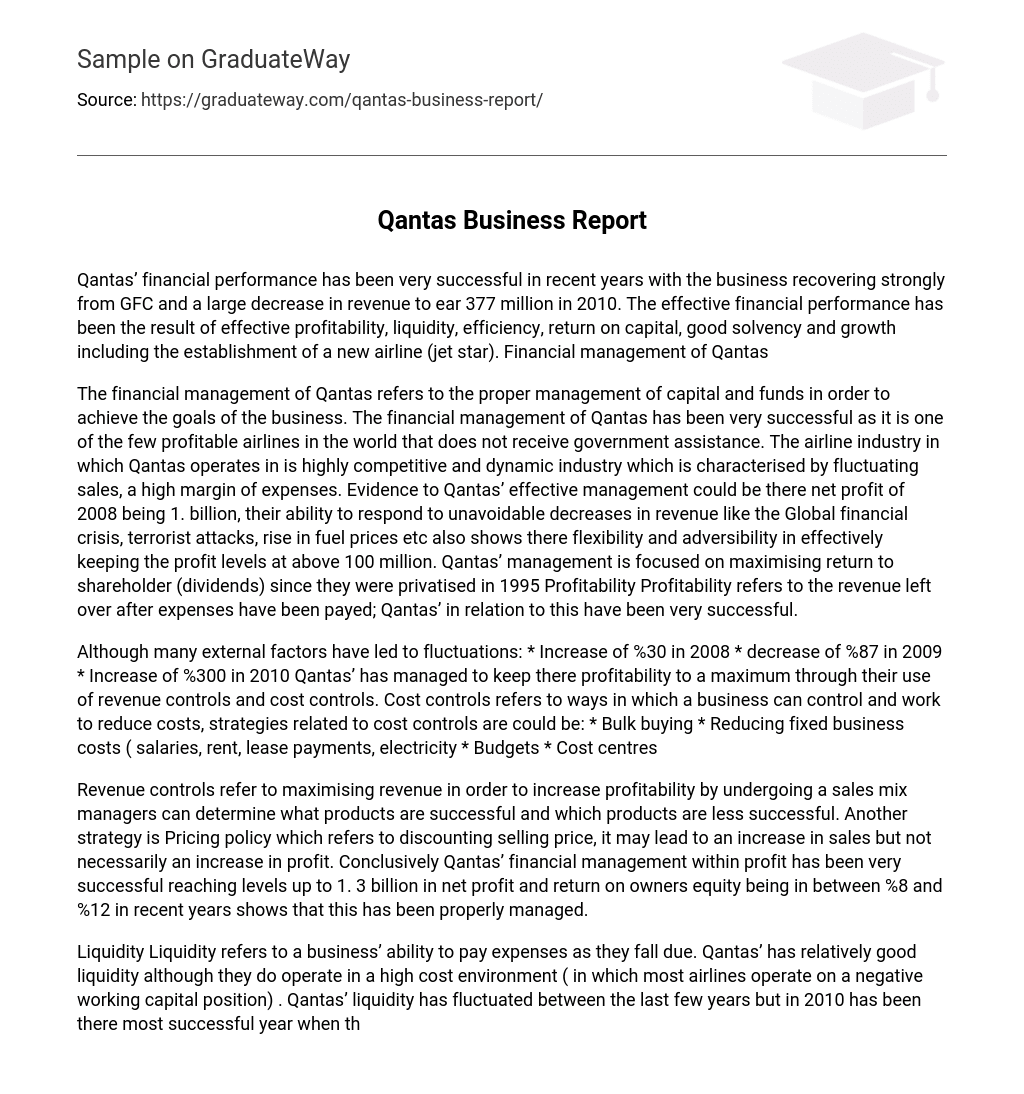Qantas has shown impressive financial performance in recent years, bouncing back from the Global Financial Crisis (GFC) and a significant decline in revenue in 2010. The company’s solid profitability, liquidity, efficiency, return on capital, solvency, and growth have all contributed to its effective financial performance. Additionally, the successful launch of Jetstar, Qantas’ new airline venture, has played a vital role in this achievement. Qantas’ effective financial management has been key to attaining these favorable outcomes.
Qantas has successfully achieved its goals by properly managing capital and funds in the highly competitive airline industry. The company has proven its ability to attain profitability without any government assistance, with a net profit of 1 billion dollars reported in 2008. Despite facing challenges such as the Global financial crisis, terrorist attacks, and rising fuel prices, Qantas has consistently maintained profits above 100 million dollars while demonstrating flexibility and resilience. Since privatization in 1995, Qantas management has prioritized maximizing returns to shareholders through dividends. In terms of profitability, which refers to the revenue remaining after expenses have been paid, Qantas has been highly successful.
Despite experiencing fluctuation due to various external influences, including a 30% increase in 2008, an 87% decrease in 2009, and a 300% increase in 2010, Qantas has managed to maintain its maximum profitability by implementing both revenue controls and cost controls. Cost controls involve the implementation of methods aimed at regulating and reducing expenses. These strategies include bulk buying, reducing fixed costs such as salaries, rent, lease payments, and electricity expenses through creating budgets and establishing cost centres.
The aim of revenue controls is to enhance profitability by maximizing revenue. One way to achieve this is by analyzing the sales mix and identifying successful and unsuccessful products. Another approach involves implementing a pricing policy that incorporates discounted selling prices. However, it should be noted that higher sales do not always translate into higher profits. In conclusion, Qantas has effectively managed its finances, resulting in net profits of up to 1.3 billion and a return on equity between 8% and 12% in recent years.
Qantas has been able to maintain good liquidity despite operating in a high-cost industry. While other airlines have negative working capital, Qantas consistently achieves positive liquidity ratios. In 2010, their most successful year, they achieved a ratio of 0.93:1. In comparison, competing airlines have current ratios of 1.4:1 and 1.1:1. Qantas’ effective strategies have enabled them to achieve these favorable ratios.
Qantas has implemented several strategies to enhance its financial performance. These tactics encompass managing current liabilities and assets while also engaging in aircraft, building, plant, and equipment leasing. This approach has allowed the company to release funds that can be allocated to other aspects of the business. Furthermore, Qantas has considered selling and leasing back its airline terminals to bolster its financial adaptability. By closely monitoring working capital and liquidity, the company aims to optimize cost/revenue controls and ensure a safety buffer for creditors.
Solvency/Gearing refers to a business’ ability to continue its operations in the long term and is a measure of its financial stability. Instead of using the traditional debt to equity ratio, airlines employ a more complex ratio to provide a clearer understanding of their gearing position. Essentially, gearing is the ratio between debt finance and equity finance. In 2009, Qantas experienced a decrease in sales/gearing as a result of the Global Financial Crisis (GFC). This year, Qantas made the decision to forego dividends and instead utilized retained profits to invest in new aircraft and improve various aspects of the business, aiming to increase revenue.
Efficiency in a business refers to its ability to maximize customer service output while minimizing operational costs and task completion time. This ratio, measured as total expenses divided by total revenue, saw a slight decrease this year from 99% to 98%, but remains strong compared to other airlines such as Singapore Airlines at 99%. Qantas has implemented the use of RSF (revenue seat factor) as a key indicator of efficiency. RSF measures the percentage of total passenger capacity utilized by paying passengers and is one of the main strategies Qantas has employed to increase efficiency.
Other strategies include: Investment in IT systems and ecommerce, more efficient aircraft (-25% fuel), and restructuring of catering and engineering. By utilizing strategies such as fuel hedging to convert a variable cost into a fixed cost, Qantas can secure a specific fuel price through contracts and save money in the event of an increase in fuel prices. The future of Qantas’ efficiency appears promising as the increased utilization of ecommerce, more fuel-efficient airplanes, and improved economies of scale contribute to minimizing the use of revenue for their day-to-day tasks.
Conclusion: In summary, I believe that Qantas has achieved successful financial management in various aspects, resulting in increased profitability, reduced costs, and stability in liquidity, RSF, solvency, and efficiency over recent years. This positive trend can be observed through the statistical data and information provided in this report. Effective financial management enables the company to successfully navigate through challenges such as environmental issues, terrorism, and fuel price increases, ensuring minimal impact on revenue, reputation, and profit.





